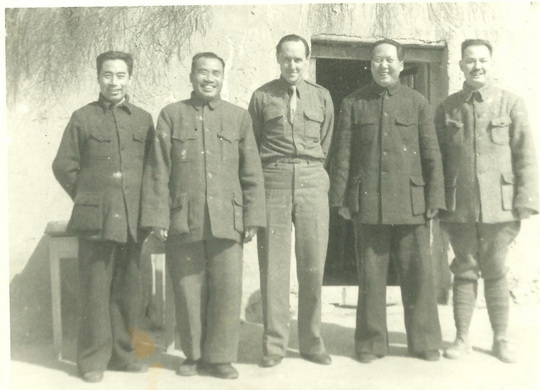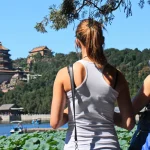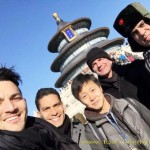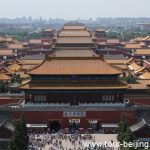Today, April 4 is Qingming Festival, a traditional Chinese festival that is an opportunity for people to remember those who passed away ( relatives, friends, important personages…).
On this special day, I’d like to dedicate my today’s humble blog post to John Paton Davies, Jr (6 Apr. 1908 – 23 Dec. 1999).
Why John Paton Davies? Actually two days ago I knew little about him. But today I’m all John Paton Davies! Empowered by internet, I’ve read plentiful articles and documents regarding John Paton Davies, a leading American diplomat who was among the “old China hands” driven from the State Department after Senator Joseph McCarthy questioned their loyalty and labeled them Communist sympathizers in the 1950’s.
My great interest in John Paton Davies was aroused by an email sent by Tiki Davies, John Paton Davies’s daughter. In her email, Tiki Davies kindly pointed out the wrong picture of her father I had posted in my blog titled Wangjiaping, a former revolutionary site in Yan’an. She went on to say she could send me the original picture of her father with Mao Zedong and Zhou Enlai. And she did! Below is the precious photo she has sent to me!

This is the photo sent by Tiki Davies (Left to Right – Zhou Enlai, Zude, JPD, Mao Zedong and Ye Jianying).
John Paton Davies was born born in Kiating ( now Leshan city), Sichuan Province, China. He was the son of John Paton Davies and Helen MacNeil Davies, who were Baptist missionaries. He learned at missionary schools in China, including the Shanghai Missionary School. He then studied successively at the University of Wisconsin Experimental College, at Yenching University in Beijing, and at Columbia University. He graduated from Columbia in 1931 and a year later joined the U.S. Foreign Service.
Early in 1942, Davies was appointed as diplomatic aide and political adviser to U.S. army general Joseph W. Stilwell, who was named commander of the allied China-Burma-India theater of war. When Stilwell was recalled by President Franklin D. Roosevelt in 1944, Davies was reassigned as a senior adviser on the staff of Patrick J. Hurley, the U.S. ambassador to China who had also been named a special presidential envoy.
From the years he had lived and worked in China, he recognized the strength of Mao Zedong’s forces and their call to the Chinese people. He also predicted that the Chinese communist forces would eventually win over the corruption-ridden Kuomintang. He advocated US relations with Communist China to forestall a Soviet takeover.
On 15, 1944, in his memo Davies proposed the idea of establishing an observers’ mission in Chinese Communist territory. Davies argued that: the Chinese communists offered attractive strategic benefits in the fight against Japan; and that the more the U.S. ignored the communists, the closer Yan’an would move to Moscow. His memorandum successfully convinced the administration of Franklin D. Roosevelt to put the plan into motion.
So Davies was instrumental in facilitating the United States Army Observation Group, commonly known as the Dixie Mission, the first U.S. effort to establish official relations with the Communist Party of China and the People’s Liberation Army, then headquartered in the mountainous city of Yan’an.
The Dixie Mission was launched on 22 July 1944 during World War II, and lasted until 11 March 1947, almost 30 years earlier than Dr. Henry A. Kissinger’s secret mission that led to the diplomatic relationship between People’s Republic of China and US in 1972.
Davies made several trips to Yan’an and passed along two offers from Mao Zedong, one to visit the United States to discuss further ties and the other to cooperate with a contemplated American landing on the Japanese-held coast.
In 1950s, Davies and about a dozen of the country’s most eminent China scholars and diplomats found themselves accused of having “lost China” after Mao’s Communist forces defeated Chiang Kai-shek’s Nationalists, supported by the American government in 1949. He was one of the China Hands, whose careers in the Foreign Service were destroyed by McCarthyism.
After a protracted battle, Davies was finally exonerated and regained his government clearance in 1969. He passed away at his home in Asheville, N.C. on 23 Dec. 1999 at the age of 91.
In China, the Dixie Mission is remembered as a positive time between the two nations, and a symbol of Sino-American cooperation. And John Paton Davies, the great man behind the Dixie Mission is to be remembered for ever.
For more about John Paton Davies, you are advised to read his posthumous autobiography “China Hand”, published on March 1, 2012 with the forward by Vanity Fair’s Todd S. Purdum and epilogue by the University of Chicago’s Dr. Bruce Cumings.
If you want to contact Tiki Davies or have more information on ” China Hand”, please use the following contact information:
Tiki Davies
(202) 369-3862
[email protected]
Rae Bazzarre
(202) 320-5134
[email protected]
Saunders Robinson
University of Pennsylvania Press
(215) 898-1674
[email protected]
China Hand is the story of a man who captures with wry insight the times in which he lived, both as observer and actor. It is an eyewitness chronicle to the events that shaped the 20th century that also delivers an eloquent testament to character.
China Hand has a foreword by Vanity Fair’s National Editor Todd S. Purdum and an epilogue by Dr. Bruce Cumings, the chairman of the history department at the University of Chicago. Strathmore will present A Singular View: The Art and Words of John Paton Davies, Jr., an exhibit of monoprints from the archives of the American diplomat and artist from March 3-April 14, 2012.
China Hand is receiving praise from award-winning journalists, authors and historians including John Lewis Gaddis, Henry Kissinger, Jon Meacham, Dan Rather and Robert MacNeil, among others (see book praise, pg. 3). China Hand, An Autobiography by John Paton Davies, Jr., published by the University of Pennsylvania Press, has a list price of $34.95. It has 376 pages, including 8 pages of black and white photos. For more information, visit www.pennpress.org.
any questions, please drop a line. Thanks!
Daniel Li
Beijing, China
Updated in December, 2020






Here’s a website with hundreds of pictures from my grandfathers Tour of duty on the “Dixie Mission”.
Hello Craig Klein,
Much appreciated!
Hello, I was wondering if you might be willing to message me regarding your wonderful photo of John Paton Davies, Jr.
Best,
Maggie
11 December 2020
Would it be possible to forward Tiki Davies email address? I am a PhD student in the Netherlands writing my dissertation about another of the China Hands, Fulton Freeman, and would love to get in touch with John Paton Davies’s’ daughter for an interview.
I know what you mean about your enthusiasm for JPD. What a life, what spirit and what a wit he was! He represents a genuine American hero. I greatly admire what/how he wrote as well as the book his daughter assembled from his unfinished writing.
My own project concerning Fulton “Tony” Freeman connects to his student year at Lingnan University in Canton (1934) and then a bicycle trip across SE Asia headed to Berlin for the 1936 Olympics. Freeman joined the Foreign Service in 1938 and was in Peiping, in Chungking from 1942-5 and back to Peiping from 1946-8.
If you are able to connect me with Ms. Davies, I would be so grateful. I think she knew him as “Uncle Tony”.
Kind regards
Suzanne Hoeben
Nijmegen, The Netherlands
Hi Suzanne Hoeben,
Such a delight to have received your email! Very glad that you are also interested in John Paton Davies. His daughter – Tiki Davies contacted me on April, 2012, about 8 years ago. I can offer you the contact information she has left me 8 years ago, which, I’m not sure if it is still available.
Please find related contact information below:
Tiki Davies
(202) 369-3862
[email protected]
Rae Bazzarre
(202) 320-5134
[email protected]
Saunders Robinson
University of Pennsylvania Press
(215) 898-1674
[email protected]
Good luck!
Daniel Li
http://www.tour-beijing.com